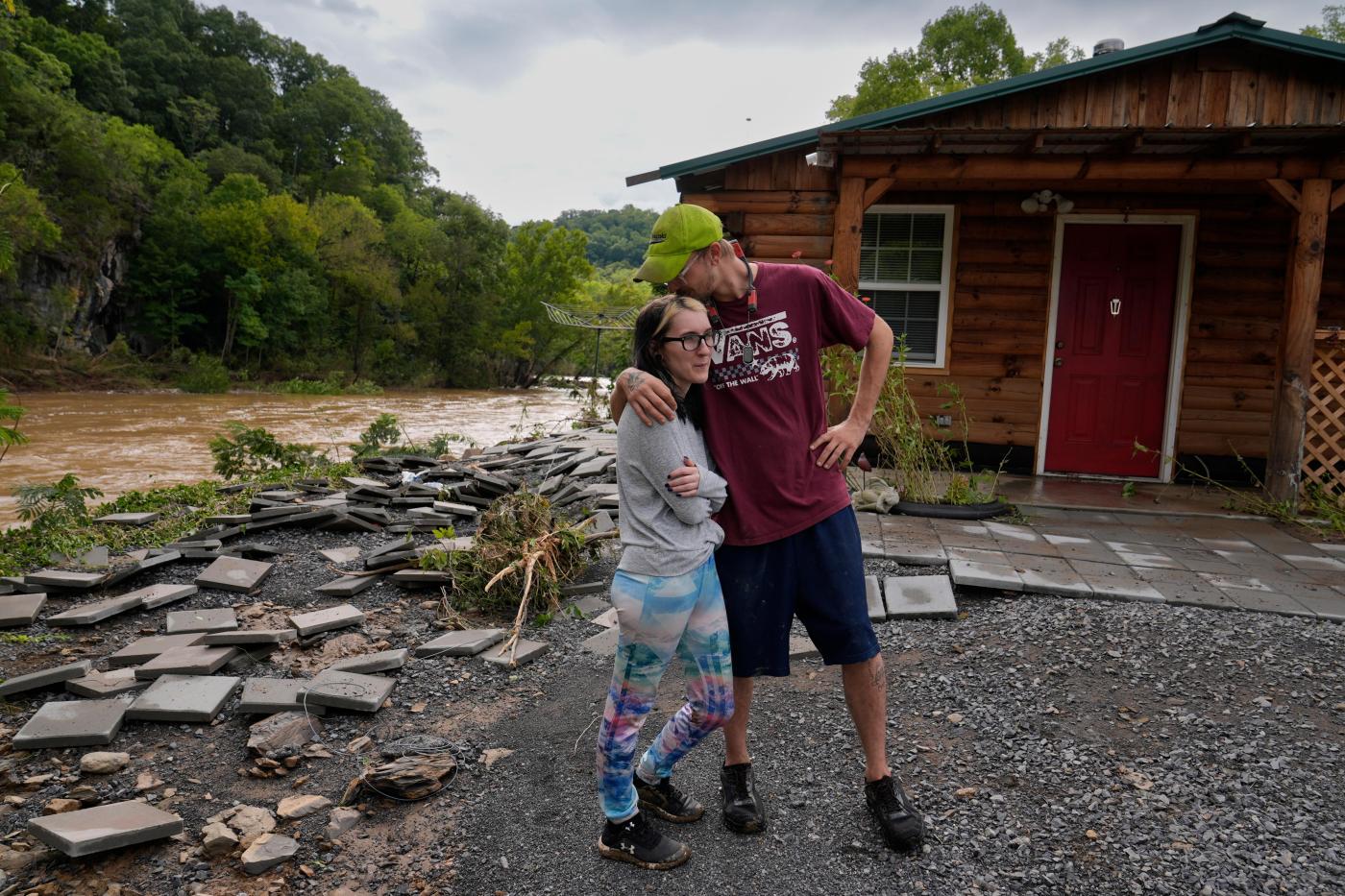By ERIK VERDUZCO, TRAVIS LOLLER and GEORGE WALKER IV
ASHEVILLE, N.C. (AP) — Floodwaters pushed by the remnants of Hurricane Helene left North Carolina’s largest mountain city isolated Saturday by damaged roads and a lack of power and cellphone service, part of a swath of destruction across southern Appalachia that left an unknown number dead and countless worried relatives unable to reach loved ones.
The storm spread misery across western North Carolina and eastern Tennessee, where on Friday authorities used a helicopter to rescue dozens of people from the rooftop of a flooded hospital. In North Carolina alone, more than 400 roads remained closed on Saturday as floodwaters began to recede and reveal the extent of damage. North Carolina Gov. Roy Cooper said that supplies were being airlifted to that part of the state. On Saturday afternoon, Buncombe County officials said that Interstate 26 between Asheville and South Carolina had reopened, but most other routes into the city were impassible.
Among those rescued from rising waters was nurse Janetta Barfield, whose car was swamped on Friday morning as she left an overnight shift at Asheville’s Mission Hospital. She said she watched a car in front of her drive through standing water and thought it was safe to proceed. But her car stalled, and within minutes water had filled her front seat up to her chest. A nearby police officer who saw her car stall helped her to safety.
“It was unbelievable how fast that creek got just in like five minutes,” Barfield said.
Early on Saturday morning, many gas stations were closed because they didn’t have electricity, and the few that were open had hourlong lines wrapped around the block. Where traffic lights were dark, drivers treated the intersections as four-way stops. The hub of tourism and arts, home to about 94,000 people, was unusually still after floodwaters swamped neighborhoods known for drawing visitors including Biltmore Village and the River Arts District, which is home to numerous galleries, shops and breweries.
More than 700,000 power customers were without power across North Carolina, including about 100,000 in Buncombe County. Interstate 40 and I-26 were impassible in multiple locations.
In Asheville, there was no cellular service and no timeline for restoration. Residents were also directed to boil their water. Local officials said they were working on setting up hubs to distribute food and water.
“We have had some loss of life,” County Emergency Services Director Van Taylor Jones told reporters. However, he said they were not ready to report specifics as they were hindered in contacting next of kin by the communications outages. Asheville Police Chief Michael Lamb said that his department had a working list of about 60 people who relatives hadn’t been able to reach and were seeking welfare checks.
Officials said they tried to prepare for the storm but its magnitude was beyond what they could have imagined.
“It’s not that we (were) not prepared, but this is going to another level,” Sheriff Quentin Miller said. “To say this caught us off-guard would be an understatement.”
Atlanta resident Francine Cavanaugh said she has been unable to reach her sister, son, or friends in the Asheville area.
“My sister checked in with me yesterday morning to find out how I was in Atlanta,” she said on Saturday. “The storm was just hitting her in Asheville, and she said it sounded really scary outside.”
Cavanaugh said her sister had no idea how bad the storm would be there. She told Cavanaugh she was going to head out to check on guests at a vacation cabin “and that’s the last I heard of her. I’ve been texting everyone that I know with no response. All phone calls go directly to voicemail.”
About 30 miles (48 kilometers) southeast of Asheville in the town of Edneyville, Genevieve Preece said she was extremely grateful that her family’s house had been largely spared and still had access to water, power and Wi-Fi. But she said so many of her neighbors were less fortunate.
Preece, who owns a utility contracting firm, opened her home to those in need, offering it as a place of refuge for those who needed to fill up water jugs or get in contact with worried family members. Her husband, meanwhile, spent hours cutting trees to clear roads with neighbors.
“We need help badly but we are all doing what we can,” Preece said. “It will be months or years to put us back together again.”
In Greene County, Tennessee, along the state line, the threat from a stressed dam had passed by Saturday afternoon. The Tennessee Valley Authority, which had warned residents overnight that the Nolichucky Dam could breach, said that a thorough review determined the dam was “stable and secure.” It was among several dams being closely monitored after the storm.
Along the Pigeon River, the small Tennessee city of Newport suffered heavy flooding.
Kendale Ball, who had opened his Simple Cafe in June after relocating from Knoxville, said water reached nearly thigh-high.
“We never anticipated it to be this devastating,” he said of the storm.
They tried to move some equipment ahead of the flooding but left town when an emergency evacuation was ordered.
“I know we lost our walk-in cooler, all the refrigeration. We’ll have to assess some of the other stuff.”
In Unicoi County, where the people were rescued from the hospital Friday, Elin Fisher and her husband had to move their camper three times to stay ahead of rising waters. They also helped to move eight other campers.
“We would move things and go, ‘Oh, we’re 30 feet above the waterline,’ go help somebody else move their thing to that level, and go, ‘Oh. We’ve got to move. Again.’ And it was just really, really rapid,” said Fisher, who along with her husband teaches whitewater standup paddleboarding on the Nolichucky River. In the middle of the final move, officials closed the road.
“All of our belongings and our home is on the other side of the river, and we can’t get to it,” she said on Saturday.
Fisher said they had been staying at a USA Raft campground just downstream of the Unicoi County Hospital, where the rescue happened. “As soon as I pulled up on the road and looked upstream at the hospital and saw that the river was coming out of its banks more and more and more, I was like, ’This is all going to go really fast.′ It was really terrifying,” she said.
___
Loller reported from Nashville and Walker from Newport, Tennessee. Associated Press writer R.J. Rico contributed to this report from Atlanta.












